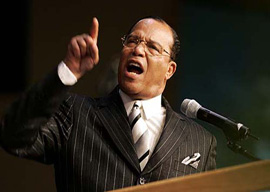
July 07, 2011

Americans are nice people. We are generous and open-hearted. Our nation is big and lush, and most of it is empty. (Our mean population density of 83 per square mile ranks us number 179 out of 240 on this list. Ireland is twice as dense; Turkey, three times; Bangladesh, thirty-five times.) The most cherished of our founding documents declares that “all men are created equal.” Our dominant religion teaches that “unto whomsoever much is given, of him shall be much required.” Plainly we are among those to whom much has been given. It follows that much is required of us; and since all men are created equal, our bounty must be extended to all without distinction.
These national attitudes look somewhat different from the outside. Our pride in our nation and our willingness to share it strikes foreigners as touching, if a bit naïve. When Bertrand Russell visited the USA in the late 1890s he recorded puzzled amusement at the way Americans asked him how he liked their country. It was, he said, as if someone were to ask: “How do you like my wife?”
Americans’ eagerness to be liked and admired has a great upside for foreigners: We are extravagantly keen to have them come settle here. We take their desire to do so as an expression of flattery, confirming our own high opinion of ourselves.
The downside of our cheerful open-handedness is that it makes the USA a great magnet for freeloaders and unscrupulous lowlifes. In the news, or flitting around the edge of it, at any given time are always half a dozen stories of such.
You don’t have to dig deep for these stories. A couple of them are always there in the first few pages of your newspaper or up front on the Drudge Report. Not uncommonly, one of them is a headliner. Among the current crop:
The accuser of Dominique Strauss-Kahn. This lady arrived from the West African nation of Guinea in 2004 claiming asylum on the grounds that she had been persecuted and raped in that country, and her husband had been murdered, because of their opposition to the ruling regime.
Prosecutors disclosed that the woman had admitted lying in her application for asylum from Guinea. According to their letter, she “fabricated the statement with the assistance of a male who provided her with a cassette recording” that she memorized. She also said that her claim that she had been the victim of a gang rape in Guinea was a lie.
In order to make that cassette recording, someone had to know exactly what to say in order to game the asylum process. Obviously someone does know.
In fact, tens of thousands of people worldwide know. US immigration, asylum, and refugee-resettlement procedures are subjects of intensive study in Third World countries. I doubt if one US citizen in ten thousand could tell you the difference between a K-1 visa and an H-4 visa; in Jakarta, Bogotá, Islamabad, and Ouagadougou, they speak of little else.
In any Third World bazaar there is a street of vendors offering help with getting into the USA. Some of the help is of a legitimate kind: translation services, college applications, connection with employers. Some is more…creative. It is highly unlikely that the cassette in the New York Times story about DSK’s accuser was made for the benefit of that one woman. More probably the production of such teaching aids is a major industry in West Africa.
Jose Antonio Vargas, a Web journalist at the Huffington Post and formerly a print journalist at the Washington Post, unmasked himself as an illegal immigrant in a long piece for The New York Times.
Vargas came to this country from his native Philippines at age 12, sent by his mother in care of a “coyote” to live with his grandparents in San Francisco. On applying for a driver’s license four years later he discovered his immigration documents were fake. Vargas kept his secret, going through high school and college and on into his career as a journalist. He was lying all the way, using forged documents and claiming US citizenship when filling out forms.